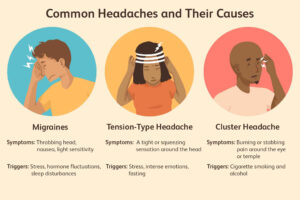What is a headache?
Headache is a very common disease that causes pain in the head and can be felt in specific areas of the head, base of the skull, or upper neck. Headaches can sometimes be mild, but in many cases, they can cause severe pain that makes it difficult to concentrate at work and perform other daily activities.
Types of headaches
There are primarily two types of headaches, Primary and Secondary headaches. The most common primary headaches are Migraine, Tension headaches, Cluster headaches, Sinus headaches, and Hormonal headaches while secondary headaches are a result of serious underlying diseases or other medical conditions such as brain infection, brain injury, brain tumor, hydrocephalus, problems with the blood vessels or very high blood pressure.
Causes of headaches
Factors that lead to headaches may be emotional (stress, depression, or anxiety), medical (migraine or high blood pressure), physical or environmental. Frequent or severe headaches can affect a person’s quality of life. When you know how to recognize the causes of a headache, it can help a person take appropriate action.
How Are Headaches Treated?
Headache symptoms may vary, depending upon the type of headache you have. Physicians may recommend different types of treatment for headaches. They can also suggest the patient visit a specialist (a neurologist).
It’s important to diagnose headaches correctly so that specific therapy can be started to help you feel better. Some people don’t need medical help at all. But those who need might get medications, electronic medical devices, counseling, stress management, and biofeedback which can help them handle their headaches.
How can headaches be treated at home?
There are several simple things you can do to ease the pain without a trip to the doctor. The best home remedies for headaches include cold or hot compresses, acupressure, and relaxation techniques. You should also make sure that you drink lots of water, improve your diet and take vitamins or supplements to relieve headache pain.
When to call a neurologist?
If you have severe headaches or accompanying symptoms that are disrupting your life, it might be a good idea to see a neurologist. Neurologists specialize in disorders of the nervous system, including the brain. You should visit a neurologist if your headache is accompanied by drowsiness, fever, vomiting, stiff neck, or pain in the ear or eye, weakness or numbness, or if you experience a severe headache that comes on suddenly or headache that doesn’t go away.




I like this website it’s a master piece! Glad I discovered
this on google.